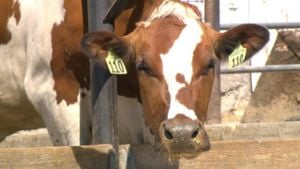The EU-Mercosur trade deal, initially celebrated as a significant economic partnership, is facing increasing opposition and backlash, particularly from the agricultural sector within the European Union. This deal, which links the European Union with the South American bloc comprising Brazil, Argentina, Paraguay, and Uruguay, has come under fire from various stakeholders worried about its long-term environmental impacts and its effects on local farming.
Recent reports indicate some prominent retailers, such as Carrefour, operating within Brazil, are now facing calls for boycotts. This reaction is largely spurred by public outrage over the perceived negative consequences of the trade agreement, particularly for European farmers. Local agricultural producers fear the influx of cheaper South American beef and agricultural products could severely undermine their businesses and lead to devastating economic repercussions.
Protests by French farmers highlight the broader concerns at play. They point to potential declines in standards for food safety, environmental protections, and worker rights. Many farmers argue they are already operating under strict regulations, and the trade deal would compromise these hard-won standards. The sentiment is echoed across various sectors, with increasing anxiety over the deal's impact on European agricultural traditions and practices.
Critics argue the deal promotes unsustainable farming practices and could exacerbate deforestation and greenhouse gas emissions. For example, Brazilian cattle ranching, known for its extensive contributions to deforestation of the Amazon rainforest, has sparked widespread outcry from environmentalists. According to estimates, emissions from cattle ranching are among the highest contributors to climate change, raising alarm bells across Europe.
On the other hand, proponents of the trade agreement argue it would strengthen economic ties and create new markets for European goods and services. They cite potential gains for several industries, including machinery, pharmaceuticals, and technology. Supporters assert this deal is more than just agricultural trade; it's about fostering stronger political relationships and securing favorable terms for European companies wishing to operate within these South American countries.
The backlash has prompted EU leaders and negotiators to address concerns raised by the agricultural community. Discussions are underway to implement specific provisions within the agreement aimed at safeguarding European farmers. These include commitments to uphold environmental standards and enforce measures against deforestation.
Yet, as negotiations continue, the divide between proponents and critics is becoming increasingly pronounced. Some farmer organizations have called for the deal's complete withdrawal, arguing no amount of compromise can mitigate the threats they perceive to their livelihoods. Their call for action resonates strongly, especially within rural communities across Europe.
Meanwhile, the political climate surrounding the trade deal is also shifting. With key elections approaching and public sentiment turning against the agreement, some politicians are pressuring the European Commission to reevaluate its stances and strategies. Many fear the backlash could damage their electoral prospects if they appear unresponsive to the concerns of constituents.
Adding to the uncertainty, environmental groups are preparing to intensify their campaigns against the deal. They are mobilizing protests, urging consumers to boycott stores and products associated with companies complicit in promoting the agreement. Their strategy is to leverage public sentiment to halt the momentum of the trade deal before it is ratified.
The question remains whether the EU will succeed in balancing economic benefits against the legitimate concerns of its agricultural sector and environmental advocates. With emotions running high, and tensions mounting among various stakeholders, how the EU responds to this backlash could shape its trade policies for years to come.



